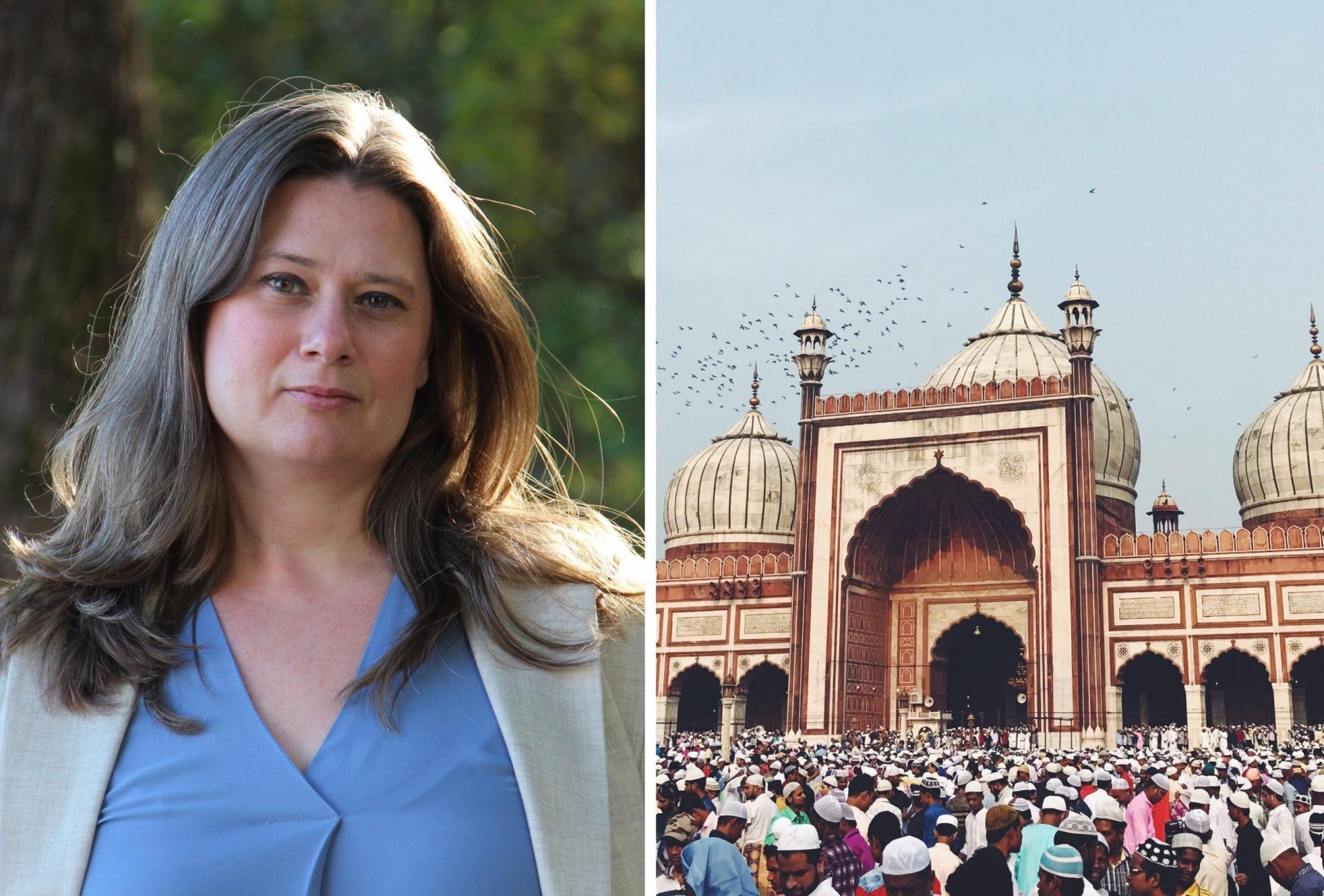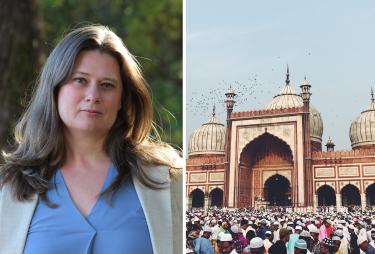The debate about the Quran burnings is filled with difficult questions about freedom of expression and religion. The issue is far from settled from a political point of view and legally there are no precedential cases to follow. To get one step closer to understanding the complexity of the issue, we asked our religious freedom expert Kristina Patring to answer a few questions.
— Legally speaking, this is a matter of freedom of expression as freedom of religion does not protect religions, but people who practice a religion or belief. In a democratic society there must be room for criticism of ideas and legally such criticism may include the burning of Qurans or other holy scriptures. Neither the international nor the Swedish legislation regarding freedom of expression and religion considers the content of the writing that is burned. On the other hand, the context and intention behind an act such as Quran burning could possibly involve hate propaganda. In the Swedish legislation regarding incitement against ethnic groups, there is jurisprudence which means that context and intent must be taken into account in a legal assessment.
— The definition of freedom of expression is in practice very broad and includes what we say, write, illustrate or choose to dress in. The concept also includes actions we perform. Just as with freedom of religion, freedom of speech does not protect people’s emotional experiences. Therefore, burning books, including sacred ones, is part of freedom of speech.
— According to the European Convention, acceptable restrictions on freedom of expression are those that protect public order, human health, morals and the security of the nation. At the same time, these restrictions must not be discriminatory, which in practice means that it is not possible to prohibit the burning of the religious writings of only one group. Restrictions may, according to the Swedish constitution, never constitute a threat to the free formation of opinions, nor be made solely because of religious reasons. A law that would prohibit the burning of Qurans would therefore be against the Swedish constitution.
— Threats or contempt with allusions to confessions of faith is already a component of the law on incitement against ethnic groups. In the past, we have not had clear judgments about how religion should be interpreted in relation to this legislation. With the district court’s ruling in Linköping on 12 October 2023, we now have a clear verdict on how threats and disrespect towards a religious group can be separated from criticism of the religion itself. The case concerns the hijacking and dissemination of a film in which, among other things, the Quran and bacon are burned, to music strongly linked to attacks against Muslims, and then placed outside the local mosque. The court states that the music, together with the location outside the local mosque, makes it clear that the film’s message can not only be considered to criticize Islam, but is aimed directly at the group of Muslims. Furthermore, the Public Order Act gives the police an opportunity to condition a demonstration permit by moving it if it is deemed to pose a direct threat to public order or safety. The Criminal Code also already contains a prohibition against disturbing worship or worship.
— In Sweden, we have a long and proud history of freedom of expression that stretches back to the 18th century, and we see ourselves as the first in the world to have it. Freedom of religion and expression are constitutional rights. In Sweden, we interpret the practice of religion as something that is first and foremost done through other rights. Religious clothing and preaching are considered to be related to freedom of expression, to gather for worship to freedom of assembly, etc. Here, the Swedish constitutional interpretation differs from international law, where all practicing of religion is a clearly protected part of religious freedom. Another important difference is that international law is very clear that the exercise of religious practice may never be restricted due to threats to the security of the state. However, freedom of speech, meeting and association may be restricted in such situations. In practice, I believe that the Swedish interpretation of the constitution means that we in Sweden have legislated around the international ban on restrictions in the event of a threat to the nation’s security.
In practice, this also means that there is very little Swedish jurisprudence in this area. The way the Constitution is interpreted and how it affects other areas of law means that it will be very difficult to pursue a purely religious freedom case regarding religious practice in our courts, and the fact that we have no constitutional court means that the Constitution cannot be tested legally against the international conventions Sweden has signed. And if it is not possible to pursue a purely religious freedom case in Sweden, it is also not possible to take a purely Swedish religious freedom case to the European Court of Human Rights as it requires that all domestic legal instances have been passed. Therefore, it becomes all the more important to be vigilant about how new legislation deals with religious practice.
— Today there are strong political forces that in various ways want to change the way we see religion in the public eye. Some point to all religions as problematic, others to certain religious interpretations as a threat. With such a development, the constitutional interpretation we now have, where restrictions on freedom of speech automatically also limit religious expression, could mean that the religious group that is considered to pose a threat is prohibited from expressing itself freely and independently about its faith and teachings. If one adds the requirement of non-discrimination, it could in turn mean a situation where all religious expressions must be scrutinized based on the extent to which they constitute a threat to the nation’s security. This may sound absurd and very far-fetched, but at the international level, there are several examples of how religious minorities, of all religions, are denied the right to freely and independently practice and express their faith because national security services and regimes have classified them as national threats.
— Many debaters are unaware of how Swedish constitutional interpretation differs from international law in terms of religious freedom. They therefore do not see that restrictions on freedom of expression can have unexpected consequences. An additional problem is that voices are now being raised to limit freedom of expression due to our NATO application and the security of the kingdom. That is a basis for limitation which according to international law may not apply to religious practice. We need to pay attention to what restrictions are proposed and what consequences they may have for our right to express religious or non-religious beliefs. We need that kind of vigilance not only concerning connections to the NATO issue but to all political moves and legislative proposals that have recently affected restrictions on freedom of expression and other rights.
— I also sometimes get the impression that we in Sweden thought that we were so good at dealing with issues like this that we have now become a bit taken aback and don’t know how to deal with these issues. Much of the debate points to the fact that we are not used to taking the guidance that e.g. The UN offers legislation in the borderland between freedom of expression and hate propaganda, such as e.g. The Rabat plan.
— It is a guiding document that the UN produced in 2013 to help states determine where the line between freedom of expression and hate propaganda lies. The rebate plan is very clear that freedom of expression is fundamental to democracy and that the threshold for when freedom of expression is restricted must therefore be kept very high. The discount plan then contains a six-point test to be applied to each individual event to determine whether an expression falls within the scope of freedom of expression or constitutes hate speech. In short, it means that statements must be assessed on the basis of:
- The socio-political context — is there e.g. already contradictions and high levels of hate crimes against certain groups in society?
- The sender’s position and influence in society.
- Sender’s intent — if the statement involves direct incitement to discrimination, hatred or violence.
- Form and content of statement
- Its reach and publicity as well
- The likelihood that the statement will lead others to act on the call.
— Here you can take the Koran burnings as an example — according to the Rabat plan, it matters if it is an event that takes place in a public place outside a mosque with people watching, or if it is done by a lone person out in a desolate place. It also matters how the event is spread in, for example, the media. But also if it is clear that the intention behind the act, as well as the actual consequence, was to increase the threat image against Muslims in society.
— It is very good that we are now having this legally tested through the ruling from the Linköping district court that came in October regarding a case from 2020 and a report regarding incitement against an ethnic group. The ruling from the Linköping district court is very clarifying when an expression constitutes incitement against a group of people and not criticism of religion, which can be accommodated within the freedom of expression. Legislation as well as the prosecution of crimes is an extremely important instrument in the fight against hate crimes and incitement to such. But the law is unfortunately a blunt preventive instrument and a more profound solution is rather about how we deal with each other’s differences in a democratic society. The preventive work is about how we preserve and build a democratic culture that protects everyone’s rights, including religious freedom — in short, how we behave towards each other.
Vi tror på en bättre värld
Tillsammans med våra medlemsorganisationer arbetar vi i tro på en bättre värld.


